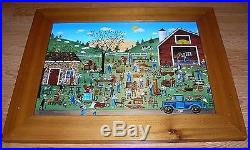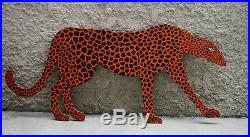
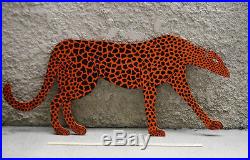

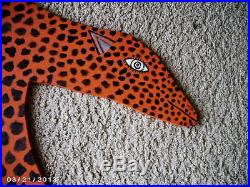

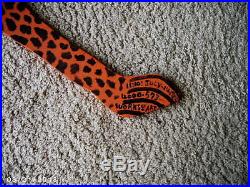




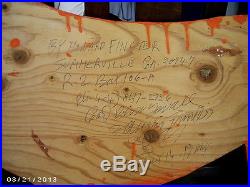

L a rge Cheetah. Painting by HOWARD FINSTER – Plywood Cut out – MUSEUM QUALITY. This is a visionary tour de force from Howard Finster, perhaps the most widely recognized and highly acclaimed “outsider” American artist of the 20th century. The cheetah motif is often found in Finster’s work, most notably in the cover art he created for Talking Heads’ album, “Little Creatures” (1985). To better judge the impressive size of this work, please note the yardstick (3 feet long) included in some of the photos to provide scale reference. As mentioned in the article below, Finster scrupulously numbered all of his work sequentially, and many have observed that his work began to decline in 1986, soon after he completed his 5,000th piece at the end of 1985. Note that this work is #4573 or “4000 573″. In addition, Finster increasingly used paint markers as he grew older and the demand for his work increased. This piece was painted with brushes only – no markers. Inscriptions Front: “11:10: JULY 14 1985 4000 573 WORKS OF ART” (left front paw); “BY HOWARD FINSTER FROM GOD 1985″ (right front paw); “JESUS SPOKE OF ANAMELS [sic] AND FOWLS (left rear paw); “THE PROPHETS SPOKE OF THE CREATURES (right rear paw). He completes his inscription with “God Bless You All” in cursive, followed his signature and “JULY 14, 1985″. On a personal note, I had the pleasure of spending many hours with Howard Finster and members of his family over the course of frequent visits to his studio in Summerville throughout the early-to-mid 80s. He was quite a character and had a terrific sense of humor. Bright orange oil paint with black enamel painted markings on plywood. Dimensions: 24 3/4″ x 3/8″ x 54 1/2. Howard Finster (December 2, 1916 October 22, 2001) was an American artist and Baptist minister from Georgia. He claimed to be inspired by God to spread the gospel through the environment of Paradise Garden and over 46,000 pieces of art. His creations overlap folk art, outsider art, naive art, and visionary art. Finster first came to widespread notice in the 1980s with his album cover designs for bands such as R. Finster was born at Valley Head, Alabama and lived on the family farm as one of 13 children. He attended school from age six into the sixth grade. He said he had his first vision at three years old, when he saw his recently deceased sister Abbie Rose walking down out of the sky wearing a white gown. She told him, Howard, you’re gonna be a man of visions. He became “born again” at a Baptist revival at the age of 13 and began to preach at 16. He gave the occasional sermon at local churches and wrote articles for the town newspaper, and became a full-time pastor at Rock Bridge Baptist Church in 1940. He later served at the Mount Carmel Baptist Church in Fort Payne, Alabama, shortly before venturing into full-time art. Finster started building his first garden park museum in Trion, Georgia in the late 1940s. It featured an exhibit on the inventions of mankind in which Finster planned to display one of everything that had ever been invented, models of houses and churches, a pigeon flock and a duck pond. When he ran out of land in Trion in 1961, he moved to Pennville, Georgia, near Summerville, and bought four acres (16,000 m²) of land upon which to build the Plant Farm Museum “to show all the wonderful things o’ God’s Creation, kinda like the Garden of Eden”. It features such attractions as the “Bible House, ” “the Mirror House, ” “the Hubcap Tower, ” “the Bicycle Tower, ” “the Machine Gun Nest, ” and the largest structure in the garden, the five-story “Folk Art Chapel”. He also started putting up signs with Bible verses on them because he felt that they stuck in people’s heads better that way. He retired from preaching in 1965 and focused all of his time on improving the Plant Farm Museum. In 1976, he had another vision to paint sacred art. One day I was workin’ on a patch job on a bicycle, and I was rubbin’ some white paint on that patch with this finger here, and I looked at the round tip o’ my finger, and there was a human face on it… Then a warm feelin’ come over my body, and a voice spoke to me and said,’Paint sacred art. His diverse range of subjects include pop culture icons like Elvis Presley, historical figures like George Washington, religious images like The Devils Vice and “John the Baptist”, UFOs and aliens, war and politics. His paintings are colorful and detailed; they use flat picture plane without perspective and are often covered with words, especially Bible verses. Every painting also has a number: God had asked him to do 5,000 paintings to spread the gospel and Finster wanted to keep track. He finished the 5,000 a few days before Christmas in 1985, but continued painting and numbering until the day he died. By 1989, he was already numbering in the ten thousands. He first started receiving outside publicity in 1975. That year, Atlanta, Georgia television station Channel 5 ran a story; he also appeared in an Esquire magazine article that first dubbed his museum Paradise Garden. He made his first exhibition appearance in 1976 and painted four paintings for the Library of Congress in 1977. He was also selected to be part of the Venice Biennale in 1984. Finster gained national fame after his collaborative work with Athens, Georgia-based rock band R. The group filmed the video for the group’s debut single “Radio Free Europe” in Finster’s Paradise Gardens in 1983. The following year, the band’s singer Michael Stipe and Finster collaborated on a painting for the cover of their second album Reckoning. After that the band made the song “Maps and Legends” (in its third album Fables of the Reconstruction) as an homage to Finster. Finster also appeared in the documentary film Athens, GA: Inside Out, filmed in 1985, in which he tells the story of how he came to be an artist. Finster (and his art) also appears in the band’s video for Radio Free Europe. The band Talking Heads commissioned a Finster painting for Little Creatures in 1985 that was subsequently selected as album cover of the year by Rolling Stone magazine. Other artists to use Finster as an album cover designer include Memory Dean, Pierce Pettis, and Adam Again. In 1994, a portion of his Paradise Garden was installed as part of the permanent collection of Atlanta’s High Museum. Bill Mallonee of the Vigilantes of Love (also a Christian from Athens, Georgia) wrote a song inspired by Finster’s artwork called The Glory and the Dream in 1994. Howard Finster was responsible for introducing millions to outsider art, but even with his fame, he remained focused on religious outreach. He said of the Talking Heads album, I think there’s twenty-six religious verses on that first cover I done for them. The classification of his creations overlap folk art and outsider art for the origin, naive art and visionary art for the content. The item “HOWARD FINSTER Cheetah 1985 Painting Plywood Cutout VERY LARGE American Folk Art” is in sale since Friday, April 07, 2017. This item is in the category “Art\Art from Dealers & Resellers\Folk Art & Primitives”. The seller is “lumkey_rhee” and is located in San Francisco, California. This item can be shipped worldwide.
- Original/Reproduction: Original
- Listed By: Dealer or Reseller
- Signed?: Signed
- Type: Paintings
- Material: Wood
- Style: Outsider
- Size Type/Largest Dimension: Large (Greater than 30″)
- Region of Origin: US-Southeast
- Date of Creation: 1970-1989

Incoming search terms:
- https://folk-art-painting com/2017/04/howard-finster-cheetah-1985-painting-plywood-cutout-very-large-american-folk-art/
